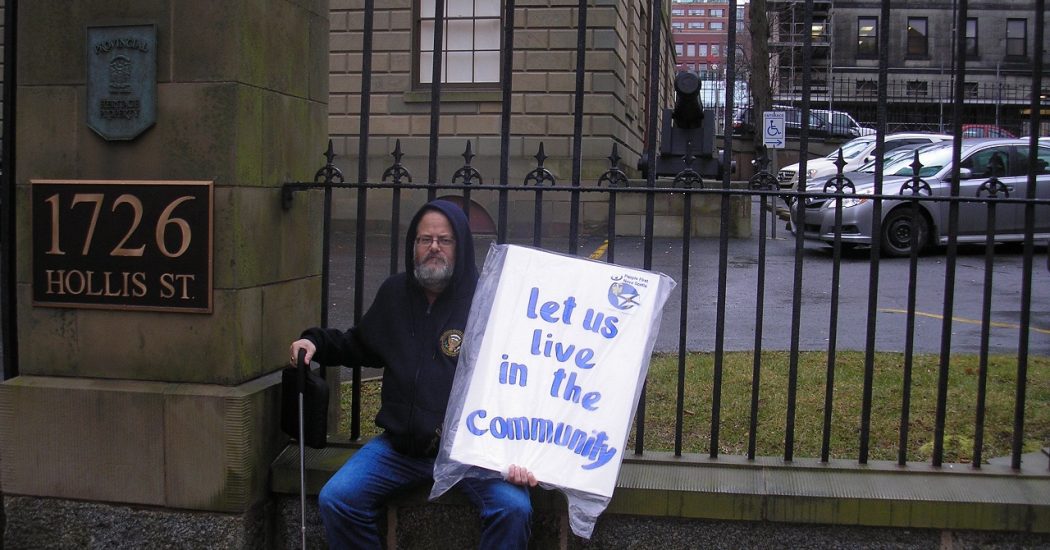KJIPUKTUK (Halifax) – When I have time I have been attending the Nova Scotia Human Rights enquiry into the lack of supportive community housing options for people with disabilities. The enquiry started in February, there have been some 20 days of testimony so far, mostly in support of the complainants. The government’s turn to respond started this Monday. Community Services is the lead department in the case.

This is what I learned.
Sometimes it gets boring
The enquiry must decide whether folks waiting for supportive housing are subjected to discrimination because of their disabilities, and if so, whether that discrimination is unreasonable.
That’s a legal question of course. Which is why there are six lawyers in the room, and an equal number of law students. And why a lot of the testimony is technical and quite boring.
Institutions aren’t fit for humans
Here in Nova Scotia, more so than anywhere else in Canada, people with physical and intellectual disabilities end up in institutions, behind locked doors, and with nothing to do.
Many witnesses spoke of their experiences with institutionalized living. The two remaining complainants at the core of the case, former residents of Emerald Hall, a locked psychiatric ward within the Nova Scotia Hospital, spoke of how deeply unhappy, and how deeply bored, they were during the many years that wretched institution was their home. Meanwhile, that they didn’t pose a danger and didn’t need to be there was never contested.
Others, institutionalized at Quest in Lower Sackville, delivered similar testimony. As we heard, even making a sandwich when you’re hungry is often out of the question when you live in an institution.
A wait list in the true sense of the word
The preferred option, living in a small home in the community, maybe with a few roommates, and with all the necessary supports, is out of reach for most.
Demand for these so-called small option homes far exceeds the supply, and there is a wait list occupied not just by people who are currently institutionalized, but also by those who live with their aging parents and require a more permanent home.
It’s called a wait list, because once you’re on it you wait.
Community Services loves a good mystery
Everything about this wait list is a mystery. You know it’s a long wait list, but you won’t know where you are on the list relative to others. You won’t know what the criteria are to make such a determination.
We did learn during testimony that having a troublesome parent, somebody who complains a lot, and goes to the press and/or to the Premier, can cause Community Services to all of a sudden move you up on the wait list and find you a suitable home.
Not telling is a bit of a modus operandi for the Department, for that matter. It certainly was a recurring theme in the testimony of many witnesses.
Community Services loves to be in charge
Another theme that emerged from the days of testimony is power, and how Community Services likes to be the one in charge.
Not only does the department want to be in charge, it wants its clients to be in the dark, as we mentioned before. These two things probably go together.
Stakeholders complained that the department doesn’t share information unless it absolutely has to. And rather than decide with you, it wants to decide for you, witnesses said.
Ableism and austerity
For me the most fascinating testimony was by Catherine Frazee, a retired Ryerson disability studies professor, activist, poet and writer who now lives in the Annapolis Valley. I wrote about her testimony here.
Frazee invited us to consider the outrage that would result of able-bodied people were treated the way Community Services treats people with complex care needs. Locked up in institutions, their agency taken away, everything about them without them. There’d be an uproar. People wouldn’t stand for it.
Why is that, Frazee asks.
Able-bodied people are viewed as productive, hardworking and competitive members of society. In contrast, people with disabilities are perceived as dependent, unproductive, and without value.
Ableism is the term that describes this unconscious tendency to consider able-bodied people the norm, and people with disabilities as deviating from that norm, and somehow of lesser value. Like sexism and racism, ableism diminishes the perspectives of others, Frazee said.
Austerity comes into play when you consider that it is much cheaper for people with disabilities to live with parents or loved ones, rather than provide them with the complex supports required for community living. It almost becomes like a cost-benefit analysis, said Frazee.
Frazee submitted an expert opinion report that describes how ableism and austerity are interwoven. You can check it out here.
If you can, please support the Nova Scotia Advocate so that it can continue to cover issues such as poverty, racism, exclusion, workers’ rights and the environment in Nova Scotia. A paywall is not an option for us, since it would exclude many readers who don’t have any disposable income at all. We rely entirely on the kindness of occasional one-time donors and a small group of loyal monthly sustainers.



